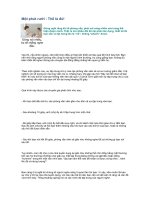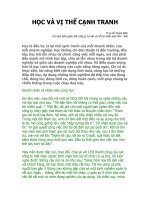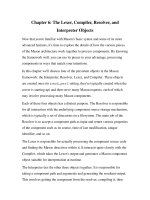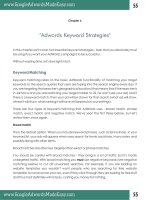Chapter 6: The Persuasive Opening pptx
Bạn đang xem bản rút gọn của tài liệu. Xem và tải ngay bản đầy đủ của tài liệu tại đây (115.14 KB, 10 trang )
Chapter 6
The Persuasive Opening
Outline
Persuasion Defined
How to Persuade
Negotiating the Agenda
Opening Stance
Agenda Framing
Persuasion
Moves others from one view or course
of action to another, more desirable
one through compelling arguments or
emotional appeals
Goal – private acceptance
•
Person chooses to adopt a new view or
take a different course of action
Step 1: Establish the agenda
Establish or set the agenda
•
Begin with secondary or possibly irrelevant issues
to obtain early agreement and establish a
positive problem-solving atmosphere
•
Lead with agreement agenda when conflict is
anticipated and fear relationship might be
damaged
•
Lead with most challenging issue when confident
you can handle the conflict
Step 2: Identify order of critical
points
Identify the issues the other side is likely to
concede
Identify the issues on which they are likely to
hold firm
Ease into disagreement by connecting it with
an earlier agreement
Identify sequence of issues based upon
likelihood of obtaining agreement (e.g.
staircase of agreement to subsequent issues)
Step 3: Plan wording
Important to plan exactly what will be
said and how each issue will be
introduced
Step 4: Allocate time to issues
Identify the amount of time allocated
for the entire negotiation
Allocate time to issues
Identify when you might move on if
success isn’t achieved
Don’t spend too much time on minor
issues that you fail to discuss major
issues
Negotiating the Agenda
Review agenda – “draft” or “suggested”
and obtain cooperation of your
counterpart
Avoid confrontation over the agenda
Invite revisions if you anticipate some
oppositions to the agenda
Stay flexible
Opening Stance
Conveys your initial position or attitude
in the negotiation
Depends upon the stance of the other
side
Prepare for a variety of stances through
if-then scenarios
Prepare both verbal & non-verbal
behavior
Agenda Framing
Framing refers to the manner in which
negotiators present options to influence their
counterpart’s choices
Skillful negotiators know how to establish
frames and prepare in advance
Utilize metaphors, images and analogies
Utilize hobbies, interests when developing
frames









